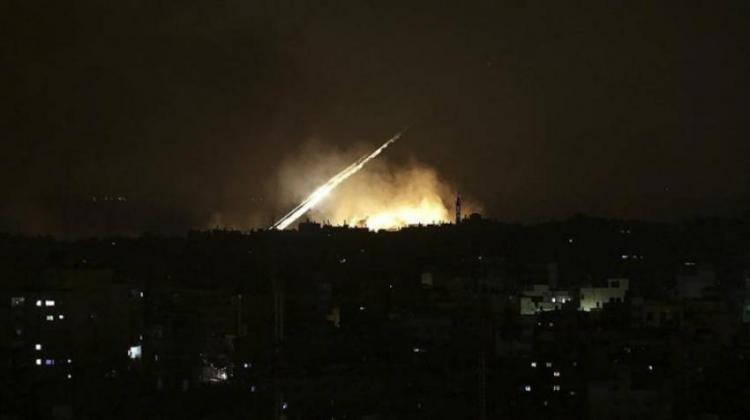The objectives and motives behind Israel s bombing of the Syrian T4 air-base
Ramallah – North-Press Agency
Ahmad Ismail
Security sources in Tel Aviv have told North-Press that the aerial attack carried out by Israeli warplanes on the T4 military air-base in Homs eastern countryside last night, targeted Iranian weapons depots at the air-base, of which will later be transferred into Hezbollah in Lebanon.
These sources considered the "T4" air-base equal to the Iranian position in Syria; therefore, targeting this base by Israel means moral and material fighting for this position. As the base represents the center and headquarters of the Iranian operations in Syria, in addition to the presence of Iranian forces and its loyal armed groups.
Arab Israeli journalist Omar Rabie assured to North-Press that it is not the first time that Israel has targeted this air-base in Homs, and has previously adopted some of the aerial attacks that were carried out against it.
Perhaps the phone call made by Israeli Prime Minister Benjamin Netanyahu with the U.S. Secretary of State Mike Pompeo last night, shortly after the bombing of the "T4" air-base, implied that Israel was behind the recent bombing. Pompeo mentioned in a tweet on Twitter about his contact with Netanyahu, underlining Washington's commitment to protecting Israel's security.
Omar Rabie confirmed that T4 air-base is of a great importance for the Iranians and is considered a strategic position for their presence in the region. It contains weapons depots that the Islamic Republic brings in and transports some into Lebanon, which threatens Israel and worries it permanently, which makes the Israeli intelligence services alarmed permanently.
Moreover, this Israeli strike follows an assessment by the Israeli intelligence services that "the opportunity is now ripe to intensify the bombings against the Iranian forces in Syria."
Omar Rabie further explained to North-Press the motives of the aforementioned Israeli intelligence assessment, that the security services in Tel Aviv believe that the possibility of a war with Iran is slim because of three main factors, most notably:
First: Iran is living its worst conditions since the Islamic Khomeinist revolution in 1979, due to the U.S. sanctions that have stifled Iran economically and politically.
Second: Countries in which Iran has an influence, such as Lebanon, Syria, and Iraq, are witnessing domestic protests against the Iranian influence and the political class loyal to Tehran, not to mention protests in the heart of the Islamic Republic itself.
Third: The assassination of the commander of the Iranian Quds Force, Major General Qasem Soleimani, constituted a moral and material blow to the project of exporting the Iranian border crossing revolution.
Therefore, the foregoing appears to be factors considered by Israel as an opportunity to intensify its strikes against Iran, and thus, the equation, according to the Israeli army, is "whenever we kill the largest possible number of Iranian forces, Tehran will refrain from sending an additional number, which would reduce the number of the Iranians in Syria."
In addition, a well-informed source has told North-Press that some of the "accurate" intelligence information that Israel obtained regarding Iranian moves in Syria is from sources working in the Russian army, while other sources represent an infiltration into the Syrian army and the pro-Iranian militias.
On the other hand, the Israeli Prime Minister Benjamin Netanyahu said two days ago that Israel knows very well the details of the Iranian nuclear program, hours after the Israeli military intelligence report which suggested that Iran would possess nuclear weapons within two years, in case it continues to enrich the uranium in the same proportion.

